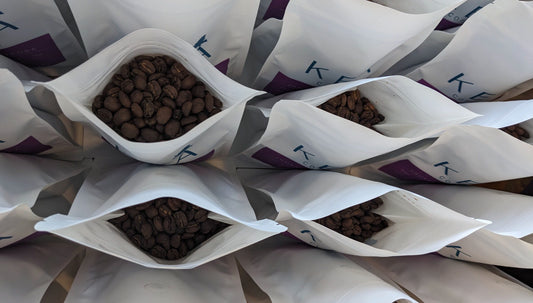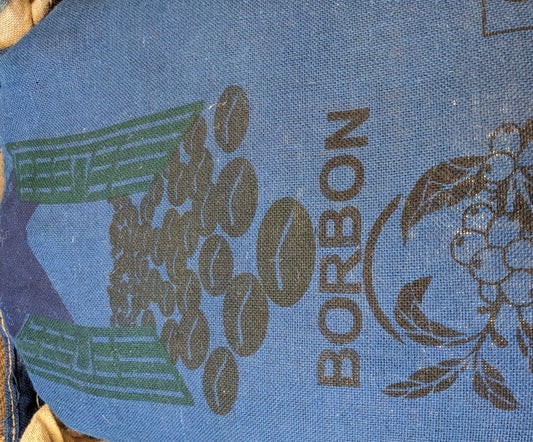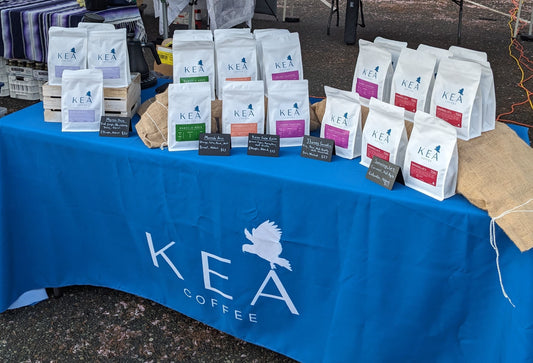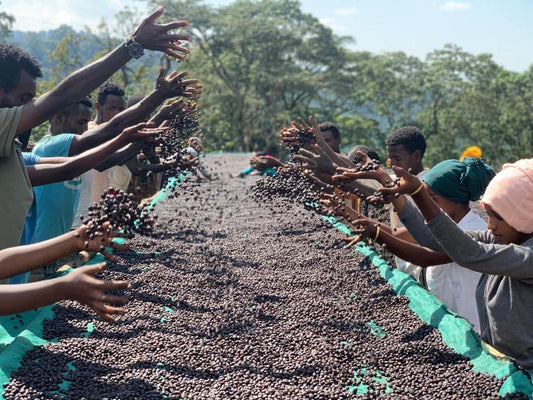Is your espresso routine stuck in a rut?
Want to change it up but not sure where to start?
Or maybe you're new to espresso and need to know how to find the best espresso beans for you?
This post has you covered.
Here's our top tips for how to choose the best coffee beans for espresso. We'll also dig into a few common misconceptions when it comes to coffee beans for espresso, as well as some tips to help you decipher what's on the bag to determine if that coffee is right for what you want from a great espresso.
Let's dive in.
Figure out if you're into traditional espressos, or more modern and adventurous espressos
If you make mostly lattes or other espresso based milk drinks, you're likely not going to be looking for a light, acidity focused coffee for your espresso base.
You'll want something more traditional. Something with body, and likely something that leans more towards sweetness with a lower acidity.
You could also try out some lighter natural processed coffees - often the fruity/berry notes can work well with milk drinks. But you might want to steer away from, say, a washed light roast with higher acidity, as this milk combo doesn't usually work as well.
On the other hand, if straight espresso is your jam you might be wanting to venture into something lighter and more modern.
Either way, deciding what flavours you want to experience and how you're going to be using those perfect shots is the first step in choosing the right espresso beans for you.
Dark Vs light roast espresso
Traditional style espresso will usually use darker roasted coffees.
That's not to say "dark roast" necessarily. Many specialty coffee roasters have great chocolatey, comfort coffees that are perfect for a traditional leaning espresso, but still would fall more under medium-ish roast rather than dark.
We have a great Columbian coffee on from Narino right now that's nowhere near dark roast, and still pulls a really comfortable and easy shot of espresso.
But, generally speaking, those comfort flavours that you enjoy and expect from a traditional espresso do take longer roast times to develop. Which usually means a slightly darker roast style.
Light roast espresso will be much brighter in the cup. You'll usually sacrifice some of the sweetness in favour of more acidity.
Dialing in a light roast espresso can be fiddely. You'll want to experiment with ratios, maybe increasing to more like a 1:2.5 or even a 1:3 to help balance out the shot and increase sweetness. Grinding finer can also help boost extraction here.
But the up side with a light roast espresso is a bright, vibrant espresso shot with intense acidity, florals and sweetness.
Make a list of any flavour notes you can think of that you know you really like in your espresso
Think about the last great espresso you had.
What flavours did you taste?
Was it chocolatey? Nutty? Fruity? Light?
Thinking through that last standout espresso you had will help you narrow down further some of the attributes you like and enjoy in a shot.
Or go to your favourite coffee shop and ask the baristas about the beans they use for their espresso. What country or origin are they from? What's the roast level? How would the baristas describe the coffee?
All of these things can help you to clarify what it is you're looking for in your perfect espresso beans.
Making sense of the bag and roasters notes. Do all coffees work for espresso??
Short answer: Yes! All coffee beans will absolutely work for espresso.
You don't need to limit your search just to beans that the roaster labels as espresso, espresso roast, or espresso blend (more on blends later).
You might have to broaden your definition of an espresso in some cases and go a little outside of traditional espresso parameters (ratio, time etc) but you can absolutely use any coffee beans you like and enjoy in your espresso drinks.
What is an omniroast?
An omniroast is roaster speak for a roast style that's designed to work well on both espresso and filter brew methods.
Omniroast profiles are developed with balance in mind, to help avoid a heavily acidic and sour shot when pulled on espresso.
What's a single origin espresso? And how is it different from an espresso blend?
Single origin espresso (often shortened to S.O. espresso) is espresso made with coffee from a single origin.
Usually that means a single lot from a single farm, wash station or community.
An espresso blend on the other hand, will contain multiple coffees from different origins.
Like any blend, the coffees used are chosen by the roaster because they each bring different characteristics to the overall flavour. And in the case of an espresso blend, the roaster builds the blend specifically with espresso in mind. That often means favouring body and sweetness, and dialling back acidity.
Espresso blends are also often darker in roast style, as more time and heat is needed in the roaster for those flavours to develop.
Which is better - single origin espresso or espresso blend?
That all depends on what you want from your espresso.
If you want a reliable and consistent flavour that you know you'll be able to get year round, then an espresso blend might be for you.
Espresso blends don't have the same seasonality that single origin espressos have, as roasters can change one of the component beans for something similar as and when green coffee stocks run out.
For example, let's say an espresso blend is 60% Brazil pulped natural, 20% Colombian washed and 20% Ethiopian natural.
Once the 20% Colombian runs out, the roaster could switch it for a different Colombian, or even find a Guatemalan or a Peru with similar enough attributes and flavours that they enjoyed in the original Colombian. And because it's only 20% of the total, you're much less likely to notice any real change in the end espresso.
On the other hand, if you like to try new coffees, and if you're into origin transparency, then a single origin espresso is probably more for you.
Always ask your roaster if you're unsure or have questions
We love helping people find coffees they'll love and enjoy.
Whenever you have any questions at all about any of our coffees, or if you need a hand selecting the right coffee for you, we'd love to hear from you.
Shoot us an email or reach out to us on socials and we'll be more than happy to help you find your next espresso obsession.
Cheers, and happy brewing!





